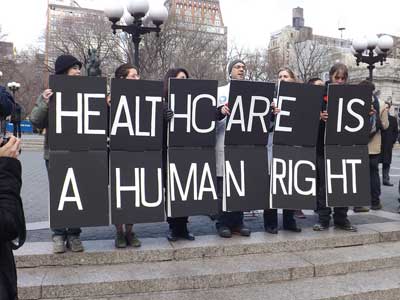
Part of the Series
Fighting for Our Lives: The Movement for Medicare for All
A coalition of groups associated with Occupy Wall Street took to the streets of midtown Manhattan on Thursday evening calling for the abolition of the for-profit health care system in the United States and the creation of a government-run single-payer system. Around 70 protesters marched to four major health insurance companies to list their grievances with each corporation, often by comparing what they see as the wildly disproportionate salaries of CEOs with health costs for regular patients or the company’s average worker’s salary.
The march was part of a larger project that Strike Debt (which formed from the creative churn of Occupy) is implementing over the week to draw attention to medical debt, which the group sees as a national emergency. Strike Debt also announced that its latest round of a project known as the Rolling Jubilee has bought and abolished over $1 million in medical debt.
Activists handed out fliers on the march with statistics on just how damaging medical debt can be to households: “62% of bankruptcies are linked to medical bills” was featured prominently on the flier, as well as on a banner at the front of the march. Also on the handout was perhaps an even more surprising number: “78% of those who declared medical bankruptcy had insurance at the time they became sick.”
Strike Debt’s mission is to politicize and organize around personal debt, often by arguing that debt is not a moral failing but rather a societal problem that needs to be addressed and resisted collectively. One of the tactics, called Rolling Jubilee, involves buying “debt for pennies on the dollar, but instead of collecting it, abolish[ing] it.” The group buys debt on the open market the same way a collection agency would, but cancels the debt instead of collecting it. Funding comes from donors who contribute to the group through its website.
The first Rolling Jubilee took place in November of last year and “abolished” more than $100,000 of medical debt. The People’s Bailout, as it was called on Twitter, culminated in a telethon at a New York City music venue and garnered unusually positive press for an Occupy-related action.
The second and latest Rolling Jubilee resulted in an even larger amount of debt abolished: over $1 million, according to a post on the group’s website, for patients in Kentucky and Indiana. “The average debtor owed around $900,” the group wrote, “and we will be abolishing the debt of over 1,000 people.” Strike Debt is in the process of sending out letters to patients whose debt has been bought and abolished, as it did following the first Rolling Jubilee.
One of the most common questions asked of Strike Debt is whether it can buy and cancel specific people’s debt. The answer is no. There are no strings attached for the person whose debt has been bought, though many activists hope that someone on the receiving end of the Rolling Jubilee might throw a few bucks back in the pot – a way of paying it forward, as it were.
Thursday’s action began at Bryant Park around 4 PM with activists opening a dozen shredded umbrellas bearing the insignias of insurance companies, such as Cigna and Aetna. The broken umbrellas represented the activists’ beliefs that even those who have private insurance are often not fully protected by it.
In contrast, the marchers also opened a dozen intact umbrellas with the words “Medicare for all” – another phrase for single-payer – painted on them.
A physician named David, part of Physicians for a National Health Program (PNHP), addressed the crowd before the march. He railed against the high costs of medical care, lambasting the idea that the solution to the problem is complicated or somehow unknowable. “The answer is single-payer,” he said.
The protesters then marched to the offices of United Healthcare Group, Aetna, Blue Cross Blue Shield, and Cigna, chanting “Health care for people, not for profit” and “Bankrupt and broke, insurance is a joke.” The flier that activists handed out on the march claims that “the combined annual compensation for the CEOs” of those four companies “could buy and abolish almost 2 billion dollars of medical debt using the rolling jubilee model.”
Katie Robbins, also with PNHP, said the “flimsy insurance [that] people get in case they get sick is a contract that gets broken all the time,” referring to the many people in the US who have insurance but nevertheless are forced to pay huge medical bills. She said that her deductible was so high that virtually any medical procedure would leave her thousands of dollars in debt. She also said that, by her calculations, having a baby could put her as much as $10,000 in debt, adding “that’s not a great place to be.”
Our most important fundraising appeal of the year
December is the most critical time of year for Truthout, because our nonprofit news is funded almost entirely by individual donations from readers like you. So before you navigate away, we ask that you take just a second to support Truthout with a tax-deductible donation.
This year is a little different. We are up against a far-reaching, wide-scale attack on press freedom coming from the Trump administration. 2025 was a year of frightening censorship, news industry corporate consolidation, and worsening financial conditions for progressive nonprofits across the board.
We can only resist Trump’s agenda by cultivating a strong base of support. The right-wing mediasphere is funded comfortably by billionaire owners and venture capitalist philanthropists. At Truthout, we have you.
We’ve set an ambitious target for our year-end campaign — a goal of $119,000 to keep up our fight against authoritarianism in 2026. Please take a meaningful action in this fight: make a one-time or monthly donation to Truthout before December 31. If you have the means, please dig deep.